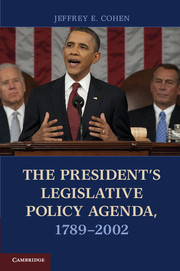Book contents
- Frontmatter
- Contents
- List of Figures
- List of Tables
- Introduction
- Chapter 1 The President's Legislative Policy Agenda
- Chapter 2 Studying Agenda Building
- Chapter 3 A Theory of Presidential Agenda Building and the Congressional Response
- Chapter 4 The Size of the President's Agenda, 1789–2002
- Chapter 5 The Substantive Content of Presidential Agendas
- Chapter 6 Divided Government and Presidential Policy Moderation
- Chapter 7 From the White House to Capitol Hill
- Chapter 8 Conclusion
- Bibliography
- Index
Chapter 3 - A Theory of Presidential Agenda Building and the Congressional Response
Published online by Cambridge University Press: 05 November 2012
- Frontmatter
- Contents
- List of Figures
- List of Tables
- Introduction
- Chapter 1 The President's Legislative Policy Agenda
- Chapter 2 Studying Agenda Building
- Chapter 3 A Theory of Presidential Agenda Building and the Congressional Response
- Chapter 4 The Size of the President's Agenda, 1789–2002
- Chapter 5 The Substantive Content of Presidential Agendas
- Chapter 6 Divided Government and Presidential Policy Moderation
- Chapter 7 From the White House to Capitol Hill
- Chapter 8 Conclusion
- Bibliography
- Index
Summary
This research seeks to resolve two puzzles introduced in the opening pages of this book, the divided government and modern president puzzles. Although these puzzles initially appear different, they raise the same basic question: Why do “divided government“ and “modern” presidents seem to allow themselves to be defeated so often in Congress? Adding to this puzzling behavior is that presidents can do several things to reduce the rate of legislative defeat. For instance, presidents can refrain from submitting proposals destined for defeat, they can modify their proposals to make them more acceptable to Congress, and/or they can gather resources that will strengthen their bargaining position with Congress. Current explanations of presidential behavior with regard to Congress do not offer satisfactory resolutions to these two puzzles. In this chapter, I present the theory of congressional anticipations as a resolution to both of these puzzles.
That theory argues that in building their legislative agendas, presidents factor in the congressional context to estimate the likelihood that Congress will accept or defeat a legislative proposal. When the expected likelihood of defeat is high, presidents might decide to refrain from submitting such a proposal to Congress, they can alter the proposal to decrease congressional opposition, and/or they can acquire resources that enhance their bargaining situation with Congress. All of these actions will reduce the frequency with which Congress rejects or fails to enact a presidential proposal for legislation. Unlike much past research, the congressional anticipations theory connects presidential agenda building to later congressional action on the president's legislative policy agenda. From the theory of congressional anticipations, we can derive hypotheses about presidential agenda-building decisions and presidential success with Congress. Some of these hypotheses differ from conventional perspectives on presidential agenda-building decisions and the factors that directly affect presidential success. This theory too is parsimonious because it focuses on one driving motivation for presidents, avoiding the cost of legislative defeat.
- Type
- Chapter
- Information
- The President's Legislative Policy Agenda, 1789–2002 , pp. 48 - 96Publisher: Cambridge University PressPrint publication year: 2012



